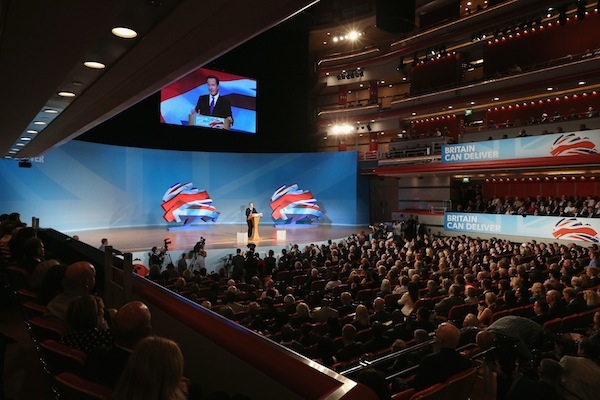The Conservative party conference has been short and sweet, and delegates are winding their ways back to constituencies and Westminster. Here are five important lessons to take away from Birmingham:
1. The government will pursue a further cuts to the welfare budget, but there’s a fight ahead on how much money can be cut, with the Liberal Democrats rejecting the George Osborne and Iain Duncan Smith’s plan for £10 billion of cuts. James examines how the relationship between Osborne and Vince Cable will be key to the negotiations over further cuts in his political column in tomorrow’s Spectator.
2. David Cameron is keen to keep both compassionate Conservatism and the Big Society alive as key brands for the Conservative party. His speech today took compassion as its big theme, telling delegates that ‘this party, our party, it has a great heart, but we don’t like wearing it on our sleeve’. He continued to pitch to the ‘strivers’, not just by making attacks on benefit dependency, but also by talking about the ‘aspiration nation’.
3. We learned next to nothing new about where the Conservative leadership stands on the issue of Europe. David Cameron decided before the conference season that he was not going to address the issue in Birmingham, but he did talk about the issue, as did William Hague. If this was showing some leg to the eurosceptics, it was actually just a bit of ankle that Tory backbenchers are very familiar with indeed: they heard ‘fresh deal’ and ‘fresh consent’ yet again, and continue to wonder whether Cameron will seize the opportunity of massive change in the eurozone to change Britain’s relationship with the European Union.
4. Boris Johnson is determined to become Conservative party leader. His rally speech and main conference address, though amusing, were very carefully written to avoid the sort of jellyfish stings that the Mayor of London likes to attack David Cameron with. It’s also notable that the only real challenge comes from outside parliament: the Cabinet is devoid of any big personality gunning to take over. Speeches by ministers were not analysed for potential leadership bids. The most ambitious senior Conservative is arguably former Defence Secretary Liam Fox, who spent the conference and the weeks running up to it re-entering frontline politics with quite some energy.
5. There are two groups emerging within the Conservative party: those who support the Britannia Unchained thesis that deregulation and a dramatic scaling back of the state will make Britain a key player on the global stage, and those who, like Robert Halfon, are wary of enthusiastic trade union bashing and want the party to talk about ‘white van man’ instead.
6. Another group, which spans all wings of the party, comprises the disgruntled 2010 intake who were not promoted. They were the grumpiest in the conference bars.
7. But there is an internal consensus on one issue: that Andrew Mitchell is doomed. Ministers were talking quite openly at parties about the chances that the chief whip will be gone by the weekend.
8. The fringe was more lively than the conference hall, and the box office events were on planning and gay marriage. These are the two issues members are most worried about: councillors repeatedly told ministers at fringes that they were worried they would lose their seats because of the planning reforms.
9. The Tory pitch for the 2015 general election will be economic competence and as the party that made radical reforms to make Britain a country where ‘strivers’ are rewarded. As James wrote earlier, Cameron is very keen to create the impression that these radical changes are Conservative – not Lib Dem or even Coalition – reforms.
10. This has been a good conference for the Tories. It’s been a good conference season for all three parties, actually. The Fixed Term Parliaments Act has deflated the mid-term conference atmosphere because there isn’t the exciting risk that a general election could be around the corner. So there have been no big rows, no attempted coups or aggressive briefings. But each conference has given us a taste of some big rows to come this autumn: Westminster is going to be far more exciting and fraught than Brighton, Manchester or Birmingham have been.







Comments